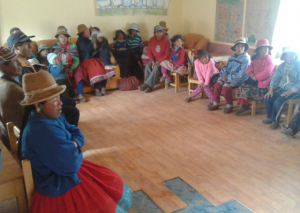
![]()
It is common to hear that a large obstacle to quality education in Peru is that parents care more about their crops and animals than their children’s education. My experience has revolved around this idea over the years and I’ve come to understand that is not the case. For the majority of parents, formal education is a foreign world, and they are uncomfortable stepping into a proactive role as formal educators. How can someone who doesn’t know how to read teach a child to read?
We ask a lot of the parents in all of our projects. There is the easy stuff like petitioning the local municipalities for support, providing physical space for our project to function and teachers to sleep, cooking and sometimes food for lunches, etc. The list goes on depending on the project.
However, the more difficult obligations are the most important ones. We visit the parents of every student in their homes twice a year, along with two public meetings per year, during which we present parents with their children’s digital progress portfolio and teach them strategies on how to help their children improve in areas like communication, math, information retention, analysis and evaluation, creative thinking, etc. Both parents must be present for all four meetings (the public ones taking up to 12 hours to complete) and then they must actually implement the strategies we’ve discussed (we check).
It is hard work for parents who, in almost every case, have little or no experience with formal education and cannot read or write themselves. Nevertheless, we develop strategies with them in mind, and create materials so that the parents can lead the activity without needing to understand the course content involved. Memory games, flash cards, literature talking points, fine motor skills projects…all are educational tools that can be implemented by parents in their homes.
The impact of involved, proactive parents is larger than any other factor we can influence. And once they see their positive impact and their teaching abilities, they are encouraged to continue and do more. Parents do care, we just have to provide the right tools and strategies to allow them to get involved.
